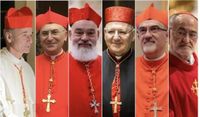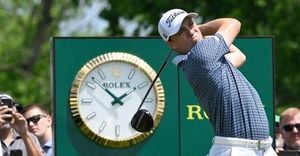As the conclave to elect a new pope unfolds, Cardinal Pierbattista Pizzaballa is emerging as a significant contender to succeed Pope Francis. The 60-year-old Latin Patriarch of Jerusalem has been living in the region since 1990, navigating the complexities of a politically charged area that is sacred to three major religions. His recent actions and statements have garnered attention, particularly his offer to exchange himself for children taken hostage by Hamas following their attack on southern Israel in October 2023.
Pizzaballa's bold declaration came just two weeks after he was elevated to cardinal on September 30, 2023. "Anything, if this can lead to freedom and bring those children back home, no problem," he stated to Vatican reporters at the time. However, he later reflected on the naivety of his comments, acknowledging the mixed reactions they received. In an interview with CNN, he remarked, "Why Israeli children and not for the Palestinian children? My answer was… also for them I’m ready. No problem." This willingness to embrace a broader humanitarian perspective has resonated with many.
In the weeks leading up to Pope Francis’ death on April 21, 2025, Pizzaballa spoke out about the ongoing violence in Gaza. "Every man of faith has questions, including myself," he shared, expressing frustration with the current state of humanity. "We cannot consider God guilty of what we are doing," he added, emphasizing the need for self-reflection and accountability.
Pope Francis, who had been an outspoken critic of Israel and a proponent of peace in the region, had made significant gestures towards humanitarian aid, including sending his popemobile to serve as a health clinic for children in Gaza. Pizzaballa’s background, growing up in poverty in northern Italy, has shaped his compassionate approach to leadership, earning him respect for his dedication to the poor and his ability to foster interfaith dialogue.
As the conclave progresses, the presence of six cardinals from the Middle East and North Africa, alongside others from Eastern Churches, signifies a shift towards broader representation within the Catholic Church. This transformation reflects the Church's commitment to addressing critical spiritual and humanitarian challenges, including political violence and support for marginalized communities.
Among the participating cardinals is Cardinal Louis Sako from Iraq, who has been a vocal advocate for ecumenical unity and has faced challenges both within his Church and with Iraqi political figures. Another notable figure is Cardinal Mario Zenari from Syria, who has served as apostolic nuncio since 2008 and has worked tirelessly to draw international attention to the suffering of the Syrian people.
Cardinal Dominique Mathieu from Iran, who was elevated to cardinal in December 2024, is known for his expertise in interfaith dialogue. Cardinal Jean-Paul Vesco from Algeria, also made a cardinal in December 2024, is recognized for his progressive views on family and women's issues and has been vocal against the ongoing conflicts in the region.
Cardinal Cristóbal López Romero from Morocco, who became archbishop of Rabat in 2018 and was elevated to cardinal in 2019, has emphasized the need to address migration as a systemic issue rather than a crisis. His diverse diocese includes believers from over 100 nationalities, showcasing his commitment to interfaith dialogue.
Experts suggest that the election of any of these cardinals could indicate a continuation of Pope Francis' progressive agenda. Carmine Soprano, a Vatican analyst, notes that Pizzaballa and his fellow Italian cardinals, Matteo Zuppi and Pietro Parolin, are all seen as "quite close to Francis" and possess the diplomatic skills necessary to navigate the complexities of the Church's future.
However, the conclave is known for its unpredictability, and those who are considered frontrunners often do not secure the papacy. As Pizzaballa himself has stated, "Faith is the only thing you can grasp, you can keep alive, in your life." His belief in transcending oneself through faith may resonate strongly as he contemplates the responsibilities that come with the papacy.
As the world watches the conclave unfold, the potential for a pope with a deep understanding of the Middle East and a commitment to humanitarian issues could mark a pivotal moment for the Catholic Church. The representation of cardinals from diverse backgrounds emphasizes the Church's recognition of its global mission and the urgent need for compassionate leadership.
In a time marked by division and conflict, the election of a new pope who embodies the values of peace, dialogue, and solidarity could inspire hope among Catholics and non-Catholics alike. The conclave's outcome will not only determine the future of the papacy but may also set the tone for how the Church engages with the pressing issues of our time.




